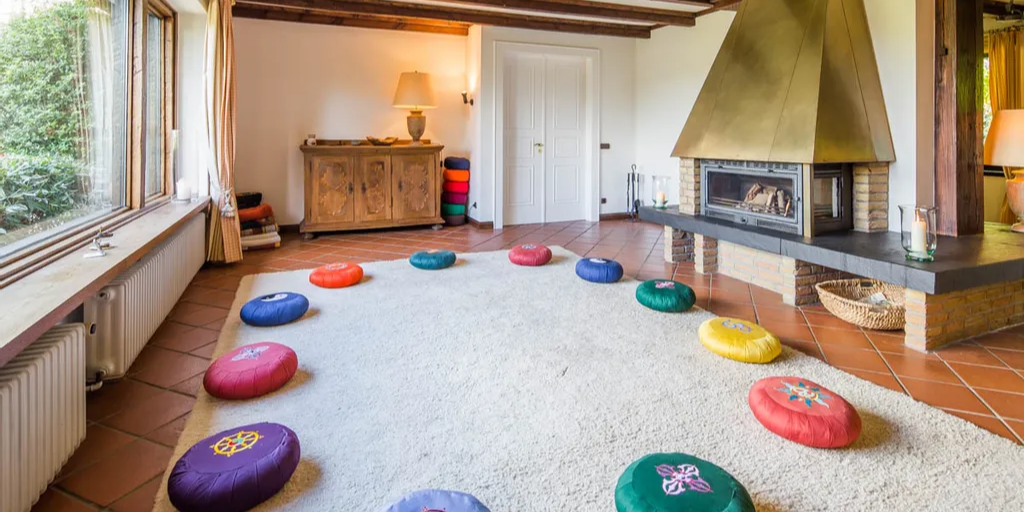In many ways I have created my dream career - I get to travel much of the year visiting some of the world's most beautiful natural locations while teaching mindfulness retreats and being of service in the personal growth of many lovely people. And, at the same time, it can be challenging, requiring my mind and body to be attentive and focused. It's critical that I prepare myself for the retreats so that I can effectively hold space for the participants, and stay energized and present for the duration.
Over the years I have learned how to get ready for these experiences, and I will share my top tips here:
Sit in Meditation Every Day - This will help you to stay calm, stay focused on what is important, and manage all the busyness that happens in the flurry of getting yourself and your participants ready to leave for the retreat.
Do Extra Yoga Classes - I teach weekly yoga classes, but I also take other people's classes before I go so that I stay physically agile, flexible, and strong.
Eat Organic Food (as much as possible) - this gives you nourishment, and reduces how hard your body has to work to eliminate impurities.
Reduce Sweets & Cut Carbs - I usually reduce my intake of sweets and cut my carbs in half because I don't want to come in sluggish and foggy-minded. It takes a particular type of attention to be "on" for a retreat.
Get Good Quality Sleep - There is so much that I can say about sleep, and in fact part of my work involves consultations to individuals and groups seeking to recover from chronic lack of sleep and other sleep-related problems. I am going to go over some of the most important points about sleep here:
Our culture has really lost sight of its reverence for sleep. Sleep is sacred. It is a gift. It has been shown that people who sleep deeply live healthier longer lives. It is not just something we do on the side. Part of the magic of sleep is that our body actually has the opportunity to do physiological healing that does not happen as effectively when we're awake. And, everything we do in our day effects how well we sleep at night.
- Thoughts - How are your thoughts? The tone of your thoughts during the day influence your sleep - do you have tense, anxious, angry, or aggressive thoughts? Mindfulness practice can help you track your mind, and assist you in learning how to neutralize the edginess of your thinking. Learning to navigate your thoughts reduces the stress in your body. Mindfulness can improve the quality of your relationships and your sleep.
- Nighttime Preparation - Before you start winding down for the night, prepare yourself for what is coming up the next day and what tasks you need to take care of prior to sleep. For example, you might have an early morning, so thinking ahead about what needs to be prepared for your upcoming day may reduce any anxiety in the middle of the night. When you wake up and you start ruminating about problems - that is really just a discharge of energy that doesn't solve anything. Preparation will help you to take action when you're awake so you can relax fully when you lie down to sleep.
- Nutrition - Our daily food choices are also an important consideration in how well we sleep. Eat a balanced meal before 7:00 pm and your body will be relaxed and ready to sleep by 10:00 pm. If you would like to sleep deeply, avoid sugar, caffeine, and alcohol past 7:00 pm. Remember - our body has to process anything we choose to eat or drink.
- Sound - At our Costa Rica retreat, the birds wake us up at 5:30am. Fortunately, after 8:30pm at night there isn't a lot to do, so our routine is to go to sleep early so that we can wake up refreshed with the birds. Spending time in the natural world wherever you are is an opportunity to quiet your body and mind. Quieting the body and mind in nature can lead to restful sleep at night.
- Light exposure - All living things on our planet have natural biological rhythms. These rhythms are in synch with the light and darkness within a 24-hour cycle. When you're getting ready for sleep it's important to cut out blue light exposure (TVs, computers, tablets, smartphones) because it inhibits our natural biological rhythms and reduces melatonin production. Melatonin is a hormone that promotes and deepens our sleep throughout the night. A good rule is no computer time after 7pm, and dim the lights in the house at that time too. Going to bed by 10:00 pm will support your body's ability to experience deeper states of sleeping and dreaming.
- Darkness - I sleep with black-out blinds on my windows because even the smallest amount of light interrupts melatonin production. (Melatonin increases antibodies that are responsible for preventing infections, and decreases inflammation in the body).
Lastly, when it comes time to waking up in the morning - be sure to get outside in the morning light (without glasses or sunglasses whenever possible) between 6am-10am (the earlier the better). Natural light promotes the release of norepinephrine to help you feel awake and alert. You are now ready to lead a retreat or to do most anything in life!
Linda Cammarata, RN, RYT is a Registered Nurse and Registered Yoga Teacher. Linda is the founder and director of Mindfulness Travels. She has extensive experience in healthcare management and in preventive medicine education, with a specialty In Natural Sleep Recovery.
Mindfulness Travels provides educational retreats to inspiring exotic places throughout the world with leaders in the field of mindfulness.Linda's upcoming retreats include: Bali, New Zealand, Italy, Spain, and Sicily.
Find more information about Mindfulness Travels on her website at www.mindfulnesstravels.com/.
